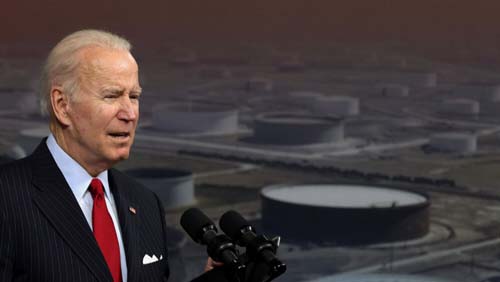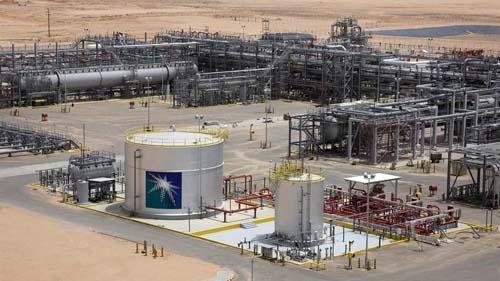
US remains a key regional player despite oil price outcry
Zaid M. Belbagi
In June 2009, when President Barack Obama sought a “new beginning” between the US and the Arab world, it seemed that Washington would engage in the region in a more meaningful way. However, his speech actually reflected another watershed moment, whereby the US steadily began disengaging from the region as it sought to counter China elsewhere and it became a major energy producer in its own right.
This trend has resulted in a more fractured region, with the increased involvement of outside powers, while regional rivalries remain unabated. This was accepted as the new status quo but, given the energy shocks of recent months, President Joe Biden’s visit to Jeddah and now the decision to cut production, the region’s importance in the regulation of energy prices has returned.
The OPEC+ group last week voted to slash oil production in a bid to shore up prices. A month before America’s midterm elections, in which energy prices are likely to be a central issue, the move created “spasm and panic” in Washington, with the Biden administration going so far as to suggest that it could work with Congress to bring a “NOPEC” antitrust suit against the oil group.
For a president who was pressured by his national security team for 18 months to make an overture toward Gulf oil producers, it is unsurprising that, after having just brought energy prices under control, this decision has confounded his administration, as Americans can now expect to pay 10 percent more for fuel at the pumps. This news, alongside potential energy blackouts now predicted elsewhere in the West, shows the crisis America’s Middle East policy is now in.

After two decades of the politics of regime change, Biden promised to make “very clear that we will protect our interests and our friends.” His “back to basics” foreign policy, though lukewarm on a strike on Iran, seemed to be keen on reinforcing ties with America’s allies. However, nearly two years in and following the debacle of the withdrawal from Afghanistan and Russia’s unchecked invasion of Ukraine, the US lacks sway.
The US has lost influence and it must work to correct this trend or risk being left out of important geopolitical deliberations, such as last week’s events
OPEC Secretary-General Haitham Al-Ghais said: “We are providing security, stability to the energy markets.” His comments — made as prices began to rise and ahead of a looming European embargo on Russian oil imports, while the Biden administration has sought to enforce a price cap on Russian crude — reflected the divergence between the US and its regional partners. This demonstrated the decline in US influence in a region that has long been considered its preserve.
In some quarters, it had been thought that the US would continue to push OPEC to increase production and ease oil prices but, just like Biden’s about-turn on Saudi Arabia in the summer, this was naive. To presume Israel could be integrated into the Middle East without ending its occupation of Palestinian territories and that he could lean on Gulf energy producers to keep prices low without solid security guarantees was incorrect.
Though the US has been in a similar situation before, as oil-producing countries sought a leap in prices following the 1972 Yom Kippur War, its responses to the two situations could not have been more different. In the late 1970s, the US sought to reengage and bolster its relations, with President Jimmy Carter warning in 1980: “An attempt by any outside force to gain control of the Gulf region will be regarded as an assault on the vital interests of the United States of America, and such an assault will be repelled by any means necessary, including military force.” This guarantee was honored by President George H.W. Bush following Iraq’s invasion of Kuwait a decade later.
Successive US administrations showed their commitment to a region that they saw as central to their energy security and, as such, provided security guarantees. Today, Biden has failed to halt the undoing of this commitment that has taken place over the last decade — and this is why the US finds itself exposed and unable to have an impact on events.
This reality was underscored last month by The Economist, which argued that “the Gulf countries will likely remain as important in global affairs in the coming decades as they were in the 20th century.” Combined with the economic news that Saudi Arabia will be the world’s fastest-growing major economy in 2022, it is increasingly clear that America’s withdrawal from the region — much like the 1968 British decision to do so “East of Aden” — was premature.
High energy prices and rising oil and gas production, combined with large-scale investment in the energy and non-energy sectors and an appetite for entrepreneurial economic risks, keep the area relevant. However, though the current spike will provide much-needed revenues for oil producers, the fight over OPEC+ production comes as the US and Europe navigate a long-term shift away from fossil fuels. The challenge for oil producers is that cutting supply will raise energy prices and increase the incentive to shift to alternatives. This is a short-term strategy that cannot halt the progress of renewables indefinitely.
America’s involvement in the region has been built on a common bargain with Middle Eastern governments: Security and military assistance in exchange for US access to military bases in the region. Washington’s military footprint in the region, which it has maintained since Carter’s 1980 speech, has allowed it to project military power. However, the debate over its presence in the region has become more complicated.
There is no doubt that the US has lost influence and it must work to correct this trend or risk being left out of important geopolitical deliberations, such as last week’s events. The American military presence in the region should be an important feature of such efforts and one that will become more vital as fuel-exporting countries grow richer. However, the ebb and flow of energy markets will mean that a complete reconfiguration of the relationship is unlikely, with the existential threat perceived by OPEC members remaining. With a shift to alternatives inevitable, they will have to seek a working relationship with the US, which remains the best security partner for their interests — that is, of course, unless regime change in Iran alters the parameters of such cooperation. As always with Middle Eastern concerns, the rules of the game are always changing.
The writer is a political commentator and an adviser to private clients between London and the GCC
